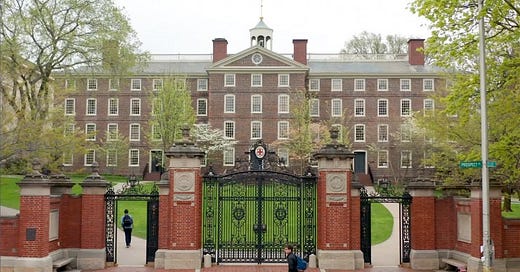Advice to the Ivies: Learn from Penn State
The Penn State Monitorship can serve as a model for beleaguered Ivies to emulate.
Universities are learning what corporations have known for a long time now – a few bad apples can prove highly expensive.
In 2008, Siemens paid a $1.6 billion penalty for committing bribery.
In 2012, HSBC paid a $1.256 billion fine for having a sham anti-money laundering program.
In 2023, Binance paid a $4.3 billion penalty for anti-money laundering and sanctions violations.
This week, two of my alma maters - Brown and Harvard Universities - joined Columbia and Princeton in finally facing the very real threat of losing hundreds of millions of dollars in federal grants for a variety of regulatory infractions.
The best colleges in the United States are in crisis mode. What can they do to protect all constituents from paying a steep penalty for the actions of a handful of bad actors? How can they restore public faith in their value to society and survive with dignity?
If they are wise, these universities will do what their own eminent historians often advise: look to the past for successful models to guide the way through this current maelstrom. Such a model exists in the form of the saving of The Pennsylvania State University (“Penn State”) a mere decade ago.
In 2012, Penn State was rocked by the discovery that a former assistant football coach, Jerry Sandusky, sexually abused underage boys on campus for decades. Worse still, administrators knew about the allegations and never acted upon them, leading to dozens more victims. After an excruciating investigation under the auspices of former FBI Director Louis Freeh, the university entered into a Consent Decree with the NCAA and The Big Ten Conference requiring it to implement 119 recommendations to ensure nothing so egregious could ever transpire again or be swept under the rug.
From 2012-2015, Senator George Mitchell and a small group of attorneys (including myself) served as independent monitors overseeing the implementation of the 119 required action items. I spent three years traveling to and from Penn State and working intimately with its nascent General Counsel’s Office and Compliance Department, its newly appointed administrators, and its board of trustees to rectify the many shortcomings that led to Penn State’s public disgrace in 2012.
Having watched closely the public devolution of our universities for the past year, I have reached the conclusion that both government attorneys and the universities themselves would benefit from taking a leaf out of the Penn State Monitorship book.
I therefore enumerate some high level and crucial lessons from Penn State’s experience that the Browns, Columbias, and Harvards of the world should take to heart.
Lesson 1: Abandon defensive mindsets and embrace this as an opportunity.
If university leadership, administrators, faculty, and students approach this crisis with stiff spines, bruised egos, stubborn refusal to acknowledge wrongdoing or error, and a revisionist account of campus activity over the past 16 months, they are doomed to fail at the outset. They must engage in honest, self-aware introspection to understand how they reached this bitter climax and to pave a constructive path back to their missions.
Yet, instead, I see much hand wringing over the fact that all students, staff, and faculty must pay a collective price for feckless administrators, a subset of faculty who trade in indoctrination rather than scholarly pursuit and education, and those weak-minded students upon whom they prey. I hear understandable concerns about the unfairness of hurting those in the sciences who are disproportionately impacted by the cutting of federal grant funding when those in the humanities have been far more culpable in fomenting unrest, discriminating against those with whom they disagree, harassing Jewish peers, and engaging in criminal acts of property destruction and violence.
Penn State’s success under the Monitorship stemmed in great part from the willingness of its newly hired and appointed administrative leadership team to acknowledge the grave ills that occurred on their campus and to approach implementing the required changes with honesty and true gusto. They aggressively accepted the challenge, rightly recognizing that it would only make their school stronger on the other side.
They threw themselves into the task, cooperating fully with our monitorship to the point where a five-year job was reduced to three years because they were so efficient and invested in not only turning their institution around but in becoming a model of best practices for higher education compliance. We worked hand in glove with the administrators, not against them, to support a school fully committed to rectifying the harm done to their community.
Those wrongs were not committed by 99.9% of the faculty, staff, administrators, and students. The administrators implementing the Consent Decree were not responsible for Jerry Sandusky’s criminal acts or Coach Joe Paterno’s and President Graham Spanier’s cover-up of those acts. They were the souls left holding the bag after the arrests and the dust settled. They recognized, however, the depth to which an unhealthy football culture had permeated every facet of their beloved school and dedicated themselves to doing the right thing.
When bad actors within organizations break the law, it is almost always the greater organization that suffers the consequences. No university knows this better than Penn State. Most anticorruption laws bind entities and hold them liable for the actions of employees and actions on their premises. Universities are, and should be, no different. Many universities today are highly regulated, corporate villages required to abide by federal and state laws that penalize that entity for any number of infractions, from failing to properly disclose campus crimes under the Clery Act to import/export control violations to infractions of The Civil Rights Act of 1964.
The main difference between a Brown and a Siemens is that no one wants to see storied universities that contribute so much to societal advancement crumble and fail. While corporations might fail under the weight of their own mismanagement or the impact of their own wrongdoing, we want our universities to thrive and succeed. We all benefit when they do. No one wants to see the fall of higher educational institutions that contribute so much good to our world.
What we do want, however, is to see those institutions operating at their maximum potential: offering the highest caliber of education to our best and brightest; engaging in valuable scholarship; promoting excellence; and providing healthy, thriving environments in which both students and scholars alike may blossom.
Unfortunately, the post-October 7th landscape has revealed that many of our universities have fallen far below such lofty standards. Administrators and boards of directors must grab hold of this chance to fix what ails their institutions. They should welcome the chance to make themselves better. Denying allegations of antisemitism on campus not only would be ridiculous and indefensible, but it also would set the universities up for failure in implementing the government’s required tasks.
And they cannot afford to fail, because if they do, they risk losing far more than federal funding. They risk losing themselves.
Lesson 2: The universities will require long-term programs of oversight to effect real change and improvements.
One month of rapid-fire actions taken under duress is not sufficient to address the deep-seated rot that infects so many of our institutions of great learning. Columbia, Harvard, Brown, and so many other schools need to engage in long-term, structural, holistic change to root out a cultural sickness.
Avoiding the pain of corporate-level punishment is going to require concrete, real change. As with all growth, such change can be a source of pain itself. Its results, however, are often a fundamental cleansing and healing from top-to-bottom in order to prevent a recurrence of infractions. In short, investing time and effort results in a healthier institution.
The majority of the requirements outlined in the demand letters sent to Columbia and Harvard (Brown’s letter remains forthcoming) to avoid the monetary penalty are actions these schools could and should have taken a year ago. Who are we kidding? They should have taken them years ago. They involve either common sense, good governance, or adherence to baseline, legal standards. Such obligations should not be onorous or repugnant to any institution that wants to shine.
The government is giving the universities a one-month grace period to take fundamental steps now – a gift most corporations do not receive. But this month must represent only the first step in a long journey of recovery.
Similar to Penn State, this situation stems from cultural erosion and rot woven deeply into the institutions’ fabric. Penn State suffered from a football culture that warped its values until they exceeded the bounds of civilized society. Today’s troubled universities suffer from their own respective cultural illnesses stemming from a toxic mix of foreign influence and incursion, lowered standards, discriminatory attitudes, and yes, rank antisemitism that have warped their values. They each require long-term, objective, external oversight to ensure fundamental restructuring at the molecular level.
Lesson 3: You will get out of this moment exactly what you put into it.
Doing the right thing is hard work. It is not always popular. It is not always cheap. It is almost never easy. It is, however, necessary for these universities to walk away from this moment stronger.
If university leadership and boards invest fully in implementing the measures in the demand letters, they will rediscover what makes their schools so special. They will give their institutions the greatest gift of their time - a bright future where all students and faculty can succeed on merit through quality scholarship in a healthy environment.
When students and faculty operate in fear of their colleagues and neighbors, no one functions at their optimal level. When intellectual diversity and rigueur are replaced by groupthink and free debate is stifled by simplistic, dishonest political rhetoric, educational value diminishes.
I do not hold out hope that most of today’s university administrators will approach the projects that await them with the dedication and gusto of Penn State’s leaders. I anticipate they will fight every act of change demanded of them, as they have since October 7, 2023. They have shown no natural willingness to do the right thing.
In short, the worst offenders of the civil rights of Jewish students today will require long-term, external monitors to hold their feet to the fire and ensure they implement government mandates. Columbia needs this. Harvard needs this. Brown needs this. UPenn needs this. UCLA needs this. Berkeley needs this. MIT needs this.
The list will be long.
And we will see how some schools rise to the occasion, as did Penn State, and how others demonstrate the need for greater levels of oversight over longer periods of time with higher levels of acrimony.
Sometimes government regulatory enforcement becomes necessary when institutions lack the independent will to do what is right. Is it fair to those constituents who did nothing wrong? Perhaps not. But instead of resisting external attempts to right their foundering ships, these universities should embrace the opportunity to heal the cultural illness that has led us to this dark moment.








It was encouraging to read how Penn State dealt with a dark chapter in their history. But in that situation, when the darkness was finally exposed it’s safe to assume that almost everyone agreed, yes this is terrible, we all must pull together to rectify this situation that it may never happen again.
This current situation is deeper and broader and more complex and honestly, do you really believe the students, faculty and administrators are going to somehow become un-antisemitic? Ever? The abuse and hatred expressed toward Jewish students was unconscionable. It wasn’t an intellectual perspective, it was gut hatred. Why wasn’t it dealt with very early on?
It’s a lot easier to clean up the Sandusky scandal than clean out the rot of antisemitism at elite universities. The liberal arts faculties drink Jew hatred daily.